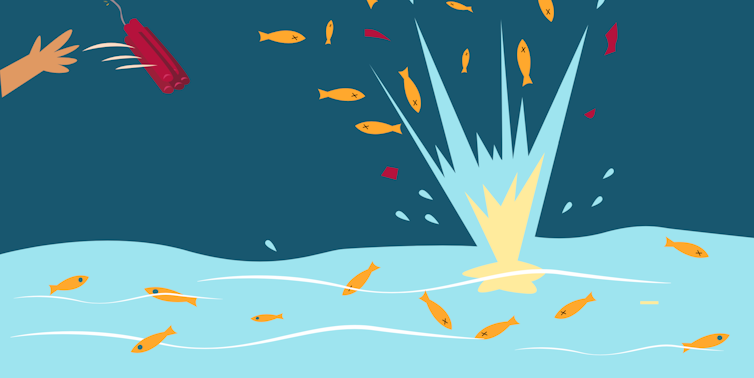
Ali Yansyah Abdurrahim, Indonesian Institute of Sciences (LIPI)
The island nation of Indonesia, where waters teem with coral fish, banned the use of bombs and cyanide for fishing in 2004.
But weak enforcement means some fishers in Indonesia still bomb reefs and poison sea creatures. But protecting Indonesia’s marine ecosystems and ceasing to use these destructive methods is, in fact, in the best interests of the country’s fisher communities.
I study human ecology. Between 2016 and 2018 I took part in research in Selayar, in South Sulawesi. The area is in the centre of the Coral Triangle, a vast network of coral reefs dotting the waters surrounding six countries in Southeast Asia and the Western Pacific.
The research team lived among fisher communities in three villages to learn why and how fishing communities in Indonesia stopped using bombs and cyanide to fish.
The study found that some individuals who previously participated in destructive fishing can transform into inspiring leaders and influence others to protect coral reefs.
We’ve collected stories of 15 champions for sustainable fishing, from former fish bombers to heads of villages (one of them female) and local government officials who work far beyond the requirements of their jobs. These individuals undergo their transformation in different ways. But, almost all of them began to change their ways after being exposed to a government program called COREMAP (Coral Reef Rehabilitation and Management Program) which implementation at the local level, ended in 2017.
Here are four of their stories.
Yudi Ansar – The death of four friends from fish bombing changed his perspective
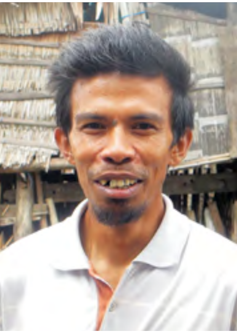
Yudi Ansar started fishing by detonating bombs underwater after graduating from high school. One day, however, a terrible bomb accident killed four of his friends.
Now 38 years old, Ansar said he couldn’t remember the exact year of his friends’ death. He said that, at the time, he was not aware that it was illegal to use bombing and cyanide to fish. Law enforcement in the Batangmata Sapo village in the east coast of Selayar district, where he was living, was weak. Several officials even protected those involved in destructive fishing.
Ansar gave up on being a fisherman and looked for other jobs. He moved to Patikarya, one of the villages in the COREMAP program.
Ansar joined the program, taking part in the Community Committee for Coastal Resource Management (LPSP). The community’s main task is to protect the coral reefs by providing villagers alternative livelihoods, such as salted fish and shrimp paste production.
Ansar now serves as a government facilitator for village development, a role that allows him to influence other fishers to abandon illegal and destructive fishing practices in Patikarya village.
Muhammad Arsyad – A former user of fish bombing and cyanide
Muhammad Arsyad began fishing using explosives in 1987, a common practice in his home village.
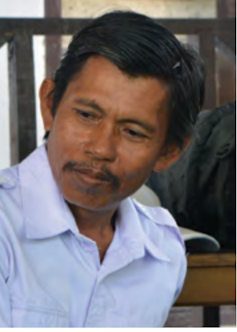
In addition to fish bombing, he learned to use cyanide for fishing from a Hong Kong-based business who hired him as the company’s buyer for groupers and clams. The company required him to teach fishers how to use chemicals for fishing.
Ansar had a side business producing salted fish. As his side business grew, he stopped fishing at the end of 2004. That year, he was appointed as a village official and became involved with the COREMAP program. He started to become aware of the adverse effects of destructive fishing.
In 2008, he became the village head. Using his influence as the village head and former fisher “boss”, Ansar influenced other “bosses” to stop fish bombing. He also involved wives and children, to increase awareness of the importance of coral reefs and alternative livelihoods. His village library provides books on coral reefs, fish processing, and crafts, to chicken farming.
Mappalewa – From a convicted fish bomber to sustainable fishing campaigner
Mappalewa, who goes just by one name, has been arrested three times for fish bombing and using cyanide for fishing.
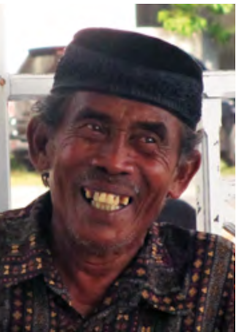
But now he is the head of his villages’ Community Committee for Coastal Resource Management (LPSP).
He started using bombs to fish in the 1980s after learning that he can catch more fish by using explosives. In the 2000s, he started using cyanide because he saw other fishers catching big live fish in large quantities.
After the government banned fish bombing and poisoning, Mappalewa began bribing local officers to continue destructive fishing.
But he ended up spending more on fines and bribes. Eventually, he realised that the methods were not worthwhile financially.
As the head of the LPSP he tells other fishers that fish bombing is not worth it, sharing his own experience.
Andi Hidayati – A female leader who stopped her village from destructive fishing
Born into a noble family, Andi Hidayati’s fight against illegal fishing initially started as she watched outsiders bomb and poison in her village waters. Then, she found out that 30% out of 246 fishers in Bungaiya were involved in the bombings and poisonings.
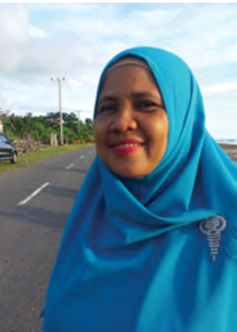
During her administration as a Village leader, Bungaiya village was part of the COREMAP program. Hidayati learned from COREMAP that local villagers did not know that fish bombing was illegal.
They told her that if they did not use bombs to fish, their incomes will suffer. They were also competing with fishers from outside Bungaiya village for local fish resources.
Nevertheless, she managed to convince the villagers to adopt alternative livelihood introduced under COREMAP programs, such as fish ball production, snacks, and other fish-based production.
Hidayati also used her authority as the village head to issue a village law on community protected areas which regulates catch zones, fishing gear and sanctions.
Later, she became involved in patrolling and catching illegal fishers with the police and village marine volunteers.
The champions profiles have been published in “Social influence for protecting coral reefs: champions and their strategies from Selayar, Indonesia” published by the Capturing Coral Reef and Related Ecosystem Services Project, a project that developed technical models, tools and knowledge products to assist managers, policy-makers and planners to manage coastal ecosystems and, in doing so, sustain the services these ecosystems provide to coastal communities.
Ali Yansyah Abdurrahim, Human Ecology Researcher, Indonesian Institute of Sciences (LIPI)
This article is republished from The Conversation under a Creative Commons license. Read the original article.
